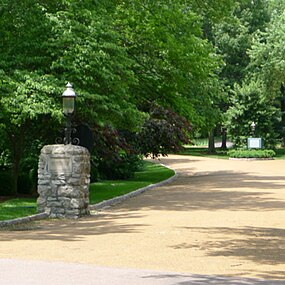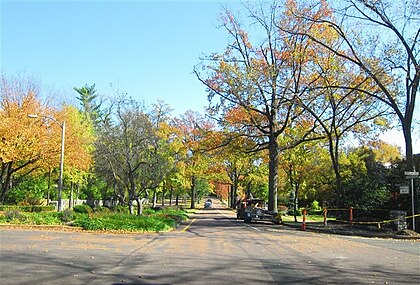Brentmoor Park, Brentmoor and Forest Ridge District
Brentmoor Park, Brentmoor and Forest Ridge District | |
 Entrance to Brentmoor subdivision | |
38°38′36″N 90°19′19″W / 38.64333°N 90.32194°W / 38.64333; -90.32194 | |
| Area | 103.6 acres (41.9 ha) |
|---|---|
| Built | 1922-24 |
| Built by | Multiple |
| Architectural style | Colonial Revival, Tudor Revival, Georgian Revival, Regency Revival, Spanish Colonial Revival, Mediterranean Revival |
| NRHP reference No. | 82004716[1] |
| Added to NRHP | September 23, 1982 |
The Brentmoor Park, Brentmoor and Forest Ridge District is a historic district comprising three private subdivisions in the city of Clayton, Missouri, a suburb of St. Louis, that were platted in 1910, 1911, and 1913, respectively by Henry Wright.[2][3] It was listed on the National Register of Historic Places in 1982.[1]
Description
Inspired by the garden city movement, Wright designed all three of the subdivisions to face inward toward their common grounds and away from the noise and congestion of Wydown Boulevard and the streetcar line which formerly ran along it. The subdivisions share common characteristics such as limited access from surrounding thoroughfares, curving interior drives, up to 3-acre (12,000 m2) lot sizes, and large, traditionally-designed houses. Brentmoor Park and Forest Ridge lie to the west of Big Bend Blvd. and flanking Wydown Blvd.; the entrances both have matching tile-roofed red granite pavilions that served as waiting areas for the streetcar that formerly ran along Wydown Blvd. Brentmoor lies to the north of Wydown Blvd. just west of Brentmoor Park; the two subdivisions were originally linked, but the connection was closed off soon after construction.[3]
Brentmoor Park was designed around a draw, or small valley, which has its lowest point near the intersection of Big Bend and Wydown. This natural land formation forms the common ground of a rectangular 33.8-acre (137,000 m2) tract. The 23-acre (93,000 m2) tract encompassing Forest Ridge has only 6 homes and rises to a central plateau with the lots planned around a large circular private park. Brentmoor's layout has a simple oval plan due to the evenness of its 49.8 acres (202,000 m2).
The three subdivisions in this district contain 47 houses, 21 of which were built in the first decade after the sites were opened, with an additional 16 homes built before 1930. The homes contain a variety of architectural styles, including Medieval and Tudor Revival, Georgian Revival, Regency Revival, Colonial Revival, Spanish Colonial, and Mediterranean. Multiple residences were designed by Wright himself, along with architects including Howard Van Doren Shaw, Jamieson and Spearl, and Maritz & Young.[3]
Gallery
-
 Entrance to the Brentmoor Park subdivision
Entrance to the Brentmoor Park subdivision -
 View of Wydown Boulevard in the Brentmoor Park, Brentmoor and Forest Ridge District
View of Wydown Boulevard in the Brentmoor Park, Brentmoor and Forest Ridge District
References
- ^ a b "National Register Information System". National Register of Historic Places. National Park Service. 2 November 2013.
- ^ "Brentmoor Park, Brentmoor and Forest Ridge District". www.philadelphiabuildings.org. Retrieved 9 April 2021.
- ^ a b c Hamilton, Esley (December 1980). "National Register of Historic Places Inventory - Nomination Form: Brentmoor Park, Brentmoor and Forest Ridge" (PDF). St. Louis County, Missouri, Department of Parks and Recreation. Missouri Department of Natural Resources. Retrieved 15 April 2011.
- v
- t
- e
- List of U.S. National Historic Landmarks by state:
- Alabama
- Alaska
- Arizona
- Arkansas
- California
- Colorado
- Connecticut
- Delaware
- Florida
- Georgia
- Hawaii
- Idaho
- Illinois
- Indiana
- Iowa
- Kansas
- Kentucky
- Louisiana
- Maine
- Maryland
- Massachusetts
- Michigan
- Minnesota
- Mississippi
- Missouri
- Montana
- Nebraska
- Nevada
- New Hampshire
- New Jersey
- New Mexico
- New York
- North Carolina
- North Dakota
- Ohio
- Oklahoma
- Oregon
- Pennsylvania
- Rhode Island
- South Carolina
- South Dakota
- Tennessee
- Texas
- Utah
- Vermont
- Virginia
- Washington
- West Virginia
- Wisconsin
- Wyoming
National Register of Historic Places portal
 Category
Category














